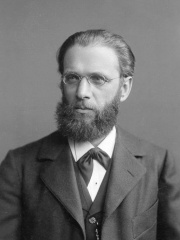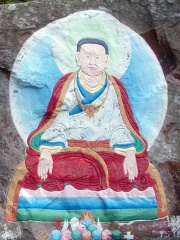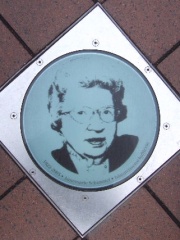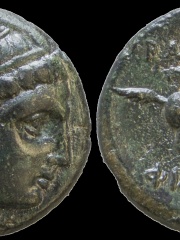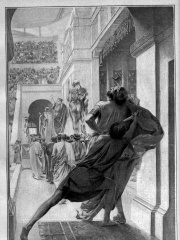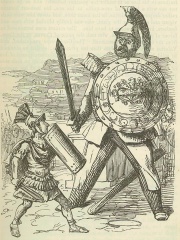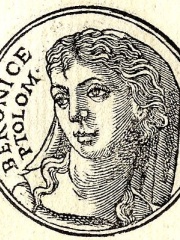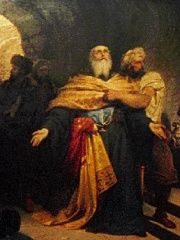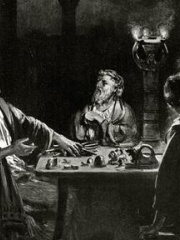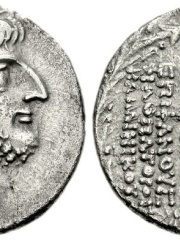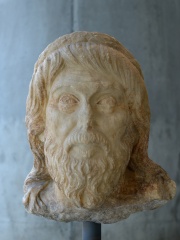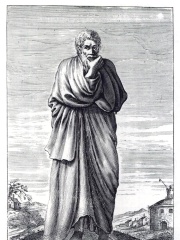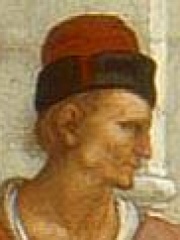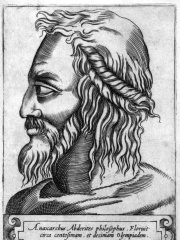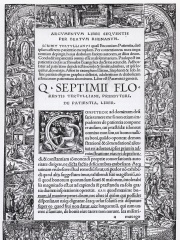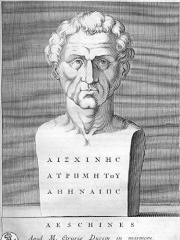Philosopher
Crates of Athens
400 BC - 268 BC
EN.WIKIPEDIA PAGE VIEWS (PV)

 Crates of Athens
Crates of Athens
His biography is available in 22 different languages on Wikipedia (up from 20 in 2024). Crates of Athens is the 538th most popular philosopher (up from 550th in 2024), the 326th most popular biography from Greece (up from 327th in 2019) and the 41st most popular Greek Philosopher.
Memorability Metrics
Page views of Crates of Athens by language
Among Philosophers
Among philosophers, Crates of Athens ranks 538 out of 1,267. Before him are Ahmad Sirhindi, Carl Stumpf, Gianni Vattimo, Myia, Charles W. Morris, and Marpa Lotsawa. After him are Jan Patočka, Annemarie Schimmel, Ammonius Hermiae, Salomon Maimon, Luis de Molina, and Albert of Saxony.
Most Popular Philosophers in Wikipedia
Go to all RankingsAhmad Sirhindi
1564 - 1624
HPI: 65.65
Rank: 532
Carl Stumpf
1848 - 1936
HPI: 65.63
Rank: 533
Gianni Vattimo
1936 - 2023
HPI: 65.61
Rank: 534
Myia
600 BC - 560 BC
HPI: 65.59
Rank: 535
Charles W. Morris
1903 - 1979
HPI: 65.55
Rank: 536
Marpa Lotsawa
1012 - 1097
HPI: 65.55
Rank: 537
Crates of Athens
400 BC - 268 BC
HPI: 65.54
Rank: 538
Jan Patočka
1907 - 1977
HPI: 65.54
Rank: 539
Annemarie Schimmel
1922 - 2003
HPI: 65.53
Rank: 540
Ammonius Hermiae
440 - 523
HPI: 65.51
Rank: 541
Salomon Maimon
1754 - 1800
HPI: 65.50
Rank: 542
Luis de Molina
1535 - 1600
HPI: 65.49
Rank: 543
Albert of Saxony
1316 - 1390
HPI: 65.47
Rank: 544
Contemporaries
Among people born in 400 BC, Crates of Athens ranks 29. Before him are Philip IV of Macedon, Pausanias of Orestis, Lais of Corinth, Polemon, Titus Manlius Imperiosus Torquatus, and Harpalus. After him are Apama, Crantor, Arete of Cyrene, Attalus, Dinocrates, and Zoilus. Among people deceased in 268 BC, Crates of Athens ranks 3. Before him are Berenice I of Egypt, and Stratonice of Syria.
Others Born in 400 BC
Go to all RankingsPhilip IV of Macedon
POLITICIAN
400 BC - 296 BC
HPI: 65.91
Rank: 23
Pausanias of Orestis
POLITICIAN
400 BC - 336 BC
HPI: 65.89
Rank: 24
Lais of Corinth
POLITICIAN
400 BC - 360 BC
HPI: 65.75
Rank: 25
Polemon
PHILOSOPHER
400 BC - 270 BC
HPI: 65.65
Rank: 26
Titus Manlius Imperiosus Torquatus
POLITICIAN
400 BC - 301 BC
HPI: 65.60
Rank: 27
Harpalus
POLITICIAN
400 BC - 323 BC
HPI: 65.55
Rank: 28
Crates of Athens
PHILOSOPHER
400 BC - 268 BC
HPI: 65.54
Rank: 29
Apama
POLITICIAN
400 BC - Present
HPI: 65.52
Rank: 30
Crantor
PHILOSOPHER
400 BC - 276 BC
HPI: 65.35
Rank: 31
Arete of Cyrene
PHILOSOPHER
400 BC - 340 BC
HPI: 65.25
Rank: 32
Attalus
POLITICIAN
400 BC - 336 BC
HPI: 65.15
Rank: 33
Dinocrates
ARCHITECT
400 BC - 360 BC
HPI: 64.98
Rank: 34
Zoilus
PHILOSOPHER
400 BC - 320 BC
HPI: 64.73
Rank: 35
Others Deceased in 268 BC
Go to all RankingsBerenice I of Egypt
POLITICIAN
340 BC - 268 BC
HPI: 73.40
Rank: 1
Stratonice of Syria
POLITICIAN
317 BC - 268 BC
HPI: 66.27
Rank: 2
Crates of Athens
PHILOSOPHER
400 BC - 268 BC
HPI: 65.54
Rank: 3
In Greece
Among people born in Greece, Crates of Athens ranks 326 out of NaN. Before him are Lais of Corinth (-400), Polemon (-400), Gregory V of Constantinople (1745), Agnes Baltsa (1944), Hierocles of Alexandria (410), and Cynisca (-430). After him are Agis III (-350), Pheidon (-700), Cleombrotus I (-500), Antiochus XII Dionysus (-150), Andocides (-440), and Phrynichus (-535).
Others born in Greece
Go to all RankingsLais of Corinth
POLITICIAN
400 BC - 360 BC
HPI: 65.75
Rank: 320
Polemon
PHILOSOPHER
400 BC - 270 BC
HPI: 65.65
Rank: 321
Gregory V of Constantinople
RELIGIOUS FIGURE
1745 - 1821
HPI: 65.64
Rank: 322
Agnes Baltsa
SINGER
1944 - Present
HPI: 65.63
Rank: 323
Hierocles of Alexandria
WRITER
410 - 500
HPI: 65.58
Rank: 324
Cynisca
POLITICIAN
430 BC - 389 BC
HPI: 65.57
Rank: 325
Crates of Athens
PHILOSOPHER
400 BC - 268 BC
HPI: 65.54
Rank: 326
Agis III
POLITICIAN
350 BC - 331 BC
HPI: 65.51
Rank: 327
Pheidon
POLITICIAN
700 BC - 670 BC
HPI: 65.50
Rank: 328
Cleombrotus I
POLITICIAN
500 BC - 371 BC
HPI: 65.50
Rank: 329
Antiochus XII Dionysus
POLITICIAN
150 BC - 84 BC
HPI: 65.50
Rank: 330
Andocides
POLITICIAN
440 BC - 391 BC
HPI: 65.47
Rank: 331
Phrynichus
WRITER
535 BC - 500 BC
HPI: 65.46
Rank: 332
Among Philosophers In Greece
Among philosophers born in Greece, Crates of Athens ranks 41. Before him are Plutarch of Athens (350), Timon of Phlius (-320), Eudemus of Rhodes (-370), Phaedo of Elis (-401), Anaxarchus (-380), and Polemon (-400). After him are Nicos Poulantzas (1936), Zoilus (-400), Cebes (-500), Aeschines of Sphettus (-430), Aristo of Chios (-300), and Onesicritus (-360).
Plutarch of Athens
350 - 431
HPI: 68.19
Rank: 35
Timon of Phlius
320 BC - 230 BC
HPI: 67.63
Rank: 36
Eudemus of Rhodes
370 BC - 300 BC
HPI: 67.42
Rank: 37
Phaedo of Elis
401 BC - 400 BC
HPI: 67.17
Rank: 38
Anaxarchus
380 BC - 320 BC
HPI: 65.78
Rank: 39
Polemon
400 BC - 270 BC
HPI: 65.65
Rank: 40
Crates of Athens
400 BC - 268 BC
HPI: 65.54
Rank: 41
Nicos Poulantzas
1936 - 1979
HPI: 64.93
Rank: 42
Zoilus
400 BC - 320 BC
HPI: 64.73
Rank: 43
Cebes
500 BC - 400 BC
HPI: 64.47
Rank: 44
Aeschines of Sphettus
430 BC - 360 BC
HPI: 64.46
Rank: 45
Aristo of Chios
300 BC - 300 BC
HPI: 64.22
Rank: 46
Onesicritus
360 BC - 290 BC
HPI: 63.05
Rank: 47

